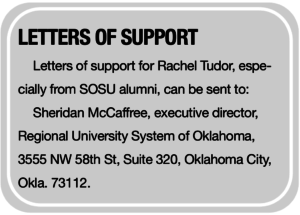Despite Rachel Tudor’s research credentials being questioned by the administration, the school will honor her with an award for outstanding scholarship
DAVID TAFFET | Staff Writer
taffet@dallasvoice.com
Rachel Tudor, an assistant professor of English at Southeastern Oklahoma State University, was denied tenure because she is transgender, according to Tudor and her supporters.
The school is located in Durant, Okla., about 20 miles north of Denison. Tudor’s employment there terminates at the end of the spring semester.
Douglas N. McMillan, interim vice president for academic affairs reportedly said that Tudor’s “lifestyle” offends his Baptist beliefs.
Last year, Tudor’s colleagues recommended her for tenure. But, she said, the administration’s response was to contact legal council to find out if they were required to honor the recommendation of the faculty committee.
“The dean refused to discuss it with me and the vice president refused to meet with me,” Tudor said.
But the president was required to reveal his reasons. School policy states that the president must honor faculty recommendations unless there is a “compelling reason” or “exceptional circumstances.”
“One reason [he gave was that] he was unable to verify I was editor of two journals,” she said. “I co-edited it with a senior colleague.”
Tudor said her co-editor told her no one ever contacted him.
“The journals are in our library,” she said. “My name is on the cover.”
 Tudor said the school’s president was also dismissive of her service for the Native American symposium held on campus.
Tudor said the school’s president was also dismissive of her service for the Native American symposium held on campus.
“That’s our main academic conference,” she said. “I served on the committee several years. I gave presentations at the conference. He said my service was neither noteworthy nor exceptional.”
She called his statement insulting to the conference.
Tudor said that another reason the school’s president gave for denying her tenure was that the tenure and promotion committee didn’t justify their reasons for the recommendation. However, she said committee members told her that they were required to make an up-or-down vote only and were not allowed to back up their recommendation.
After being denied tenure during their sixth year at the school, faculty members are allowed to reapply during the seventh and final year of their initial contracts.
Tudor said she knows of three faculty members in her building who were granted tenure after initially being denied. She was set to resubmit her portfolio when McMillan issued a memo that he would not allow her to apply this year.
“He said it would be a waste of the faculty’s time — although they were on board,” she said. “And it would enflame tensions between faculty and administration.”
She filed a grievance and the faculty committee voted unanimously to recommend her for tenure.
“Someone who works in the business office who was designated by the president to take the recommendation to the president,” she said decided he was opposed to her tenure and decided not to take the recommendation to the president.
Tudor wondered if that was legal.
The president said she could not reapply because of policy and precedent, but Tudor said she knows of three who successfully reapplied.
The administration began claiming that her scholarship was flawed.
“In the past two years, I’ve have 10 peer-reviewed publications,” she said. “This is a teaching university. The department chair doesn’t have 10.”
The faculty senate passed a resolution supporting her.
“It was an act of courage for them to vote for me,” she said.
When Tudor transitioned four years ago, McMillan questioned whether she could just be summarily dismissed. He was told that would be gender discrimination. She said that gender is included under the Department of Education’s Title IX.
In addition, the faculty senate voted to add gender identity to the school’s nondiscrimination policy, although she is not sure if the administration has recognized that vote.
Oddly, on April 26, the school issued a press release announcing that Tudor would receive an award for outstanding scholarship.
Alan Burton, director of university communications for SOSU, said, “Southeastern Oklahoma State University does not discriminate in its employment practices. The university will not discuss or comment on specific personnel issues.”
Once the semester is over, Tudor said, she plans to fight.
“I’m focused on correcting this injustice,” she said. “If that means staying here in Durant, that’s what I’ll do. I’m committed to seeing justice done here.”
She’s been in touch with the Equal Employment Opportunity Commission and the Oklahoma Human Rights Commission.
An online petition has been started and she is appealing to the executive director of the Regional University System of Oklahoma that oversees Southeastern State.


Alumni… will be writing a letter and making phone calls this afternoon. This school has been very fortunate to have grown substantially since my initial enrollment. I have since moved out of state, but still find it very frustrating that the LGBT community has no voice or discernible representation at this school. Just a shame.
The US Supreme Court case of Diane Schroer vs. the Library of Congress has already made it illegal to discriminate against someone that is transitioning from one sex to another. That ruling came in 2008. The school administration better get with the times right now or they will lose this case and pay hefty fines.
Stay strong Rachel and kudos on the article David!
I would like to respond to Alan Burton’s statement, “SOSU does not discriminate in its employment practices.” I serve (until May 31st) on SOSU’s faculty Policies and Personnel Committee–we drafted and the faculty Senate passed an amendment to the Policy and Proceedures Handbook to specifically prohibit discrimination against the LGBT community some six month ago–I just checked the Policy and Procedures Handbook online–and the administration still has not amended the antidiscrminaition policy to include us. I discussed the amendment with a senior colleague the other day, and he said when he was on the faculty Senate some TEN YEARS ago–they passed a similar amendment and sent it to the administration. It is misleading and disingenerous for Alan Burton to proclaim that SOSU does not discriminate when the administration has refused–for at least TEN YEARS–to include LGBT in its Policy and Proceedures antidiscrimination policy. Their refusal is in direct oppostition to the specific recommendation and repeated requests of the faculty for its inclusion. Please ask Alan Burton if he is making a public policy announcement in reference to transgender faculty–since he issued his statement (“SOSU do not discriminate”) in reference to a specific case involving a transgender professor. If SOSU does not include LGBT faculty in its policy manual, then it is a falsehood to claim that we are. If we are included–why won’t the administration amend the manual as requested?
I live just south of Durant and I was going to attend SOSU in the fall but not anymore. I won’t support bigotry.
Rachel, I support you and I’m sure many of the LGBT students do as well!
This is a terrible unjust action and deserves ACLU or other lawsuits. For an administrator at a public institutiuon to use his ‘Baptist’ beliefs as a reason is clearly unconstitutional as is the reason to release a transgendered person by Federal law. This should be a slam dunk Federal court case for Rachel. Has ACLU or other attorneys been asked for help here? LGBT persons now have rights and the faculty there should be raising hell with their administration. Also, the American Association of University Professors (AAUP) should be called in to review this case; They would have interest in that the established policies for review of faculty dismissal were not followed. I would expect that they would place the institution on their ‘blacklist’ – something that institutions really try to avoid. Persons there supportive of Rachel should contact these organizations and unite in support in a meaningful way. This just adds to the bad image Oklahoma has gained by the actions of such people as Sally Kern amnd her allies.
This case should also be of interest to Americans United for Separation of Church and State.(AU). Local supporters should also contact both the national office and state office of AU for assistance and publicity. Someone at SOSU take a lead, Google these orgasnizations and send them the details! This case should not be allowed to stand as it now is. If this case stands, faculty at SOSU will have no appropriate rights with their administration.
On SOSU changing their policies on the fly, it isn’t the first time they’ve done that. Though not as serious as this issue they used to require one to have at least a degree before they were considered for the positon of Director or Assistant Director. They changed that one shortly before a recent hiring/promotion on campus. Like i said, not anywhere as serious but it does show that they have done it in the past and will continue to do it in the future.